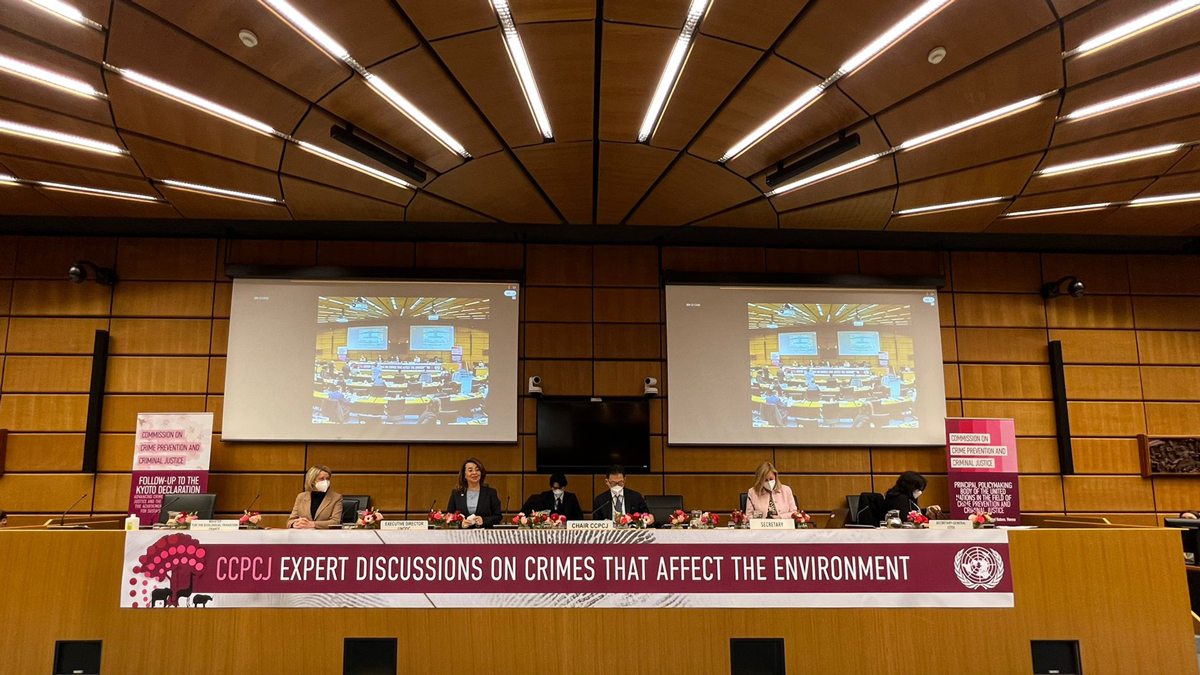
Vienna (Austria), 16 February 2022 – Each year, while countless species are driven closer to extinction, criminals make billions from the sale of protected wildlife products. Recognizing the need to act now, over 800 participants from 94 countries attended the expert discussion of the Commission on Crime Prevention and Criminal Justice (CCPCJ) for an exchange on crimes that affect the environment.
Crimes that affect the environment are among the most profitable crimes with manifold negative impacts. Addressing such crimes is an integral element to achieving Agenda 2030 and addressing the biodiversity and climate crises.
“To save lives and livelihoods, defend nature and natural resources, protect health and habitats, we must work together better to stop the criminal exploitation,” said UNODC Executive Director Ghada Waly.
During the meetings from 14 to 16 February, national practitioners and policymakers, UN entities, other intergovernmental and international organizations, and civil society experts exchanged good practices and lessons learned in preventing and combating these crimes and strengthening international cooperation.
Ms. Barbara Pompili, Minister for Ecological Transition of France, highlighted that “France is committed to strengthening its long-term partnership to fight against crimes that affect the environment, within the framework of a joint action plan with UNODC.”
Ms. Ivonne Higuero, Secretariat-General of the Convention on International Trade in Endangered Species of Wild Fauna and Flora (CITES), emphasized that “the follow-up work of the CCPCJ in response to the Kyoto Declaration is timely and essential, especially given the scale and nature of crimes that affect the environment”.
“It is only by working together that we respond to the increasing sophistication of environmental crime operations and create a better future for everyone” underscored Ms. Inger Andersen, Executive Director of the United Nations Environment Programme in her video message.
The Chair of CCPCJ, Ambassador Hikihara Takeshi (Japan), recalled that in the Kyoto Declaration, adopted by the 14th UN Crime Congress in March 2021, Member States decided to prevent and combat crimes that affect the environment by making the best possible use of relevant international instruments and by strengthening legislation, international cooperation, capacity-building, criminal justice responses and law enforcement efforts.
He recognized that the Expert Discussions would be an important contribution to the effective implementation of the Kyoto Declaration and the Sustainable Development Goals.
Six online side events were held at the margins of the sessions, covering topics regarding crimes that affect the environment, such as: the impact of UNODC tools; good practices and challenges in addressing illicit financial flows; tackling deforestation and land grabbing with environmental criminal law in Colombia; Strengthening international cooperation in Colombia; the nexus between climate change, trafficking in persons and smuggling of migrants; and carbon credit banks and data warehouse.
***
During the thirtieth session in May 2021, the CCPCJ approved a resolution, entitled “Preventing and combating crimes that affect the environment”, which was adopted by the General Assembly in December 2021. Operative paragraph 15 of the resolution called upon the CCPCJ to hold, during the intersessional period, expert discussions crimes that affect the environment with a view to discuss concrete ways to improve strategies and responses thereto.
* *** *
The Commission on Crime Prevention and Criminal Justice is the principal policymaking body of the United Nations in the field of crime prevention and criminal justice. The expert discussions aim to raise awareness of crimes that affect the environment as well as to bring together the relevant stakeholders to share their expertise, with the CCPCJ acting as the convening forum for dialogue.
General Assembly resolution 76/185 | Preventing and combating crimes that affect the environment